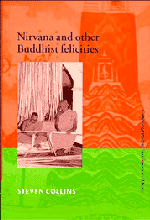Book contents
- Frontmatter
- Contents
- Preface and acknowledgments
- List of abbreviations
- Textual chronology
- General introduction: Buddhism and civilizational history 1 – structures and processes
- PART 1 NIRVANA IN AND OUT OF TIME
- PART 2 PARADISE IN HEAVEN AND ON EARTH
- Introduction to part 2: utopia and the ideal society
- 4 Heaven, the land of Cockaygne and Arcadia
- 5 Millennialism
- 6 The perfect moral commonwealth? Kingship and its discontents
- 7 The Vessantara Jātaka
- Conclusion to part 2: in what sense can one speak of Buddhist utopianism?
- General conclusion: Buddhism and civilizational history 2 – reprise
- Appendices (translated texts)
- Bibliography
- Glossary and index of Pali and Sanskrit words
- Name index
- Subject index
5 - Millennialism
Published online by Cambridge University Press: 18 December 2009
- Frontmatter
- Contents
- Preface and acknowledgments
- List of abbreviations
- Textual chronology
- General introduction: Buddhism and civilizational history 1 – structures and processes
- PART 1 NIRVANA IN AND OUT OF TIME
- PART 2 PARADISE IN HEAVEN AND ON EARTH
- Introduction to part 2: utopia and the ideal society
- 4 Heaven, the land of Cockaygne and Arcadia
- 5 Millennialism
- 6 The perfect moral commonwealth? Kingship and its discontents
- 7 The Vessantara Jātaka
- Conclusion to part 2: in what sense can one speak of Buddhist utopianism?
- General conclusion: Buddhism and civilizational history 2 – reprise
- Appendices (translated texts)
- Bibliography
- Glossary and index of Pali and Sanskrit words
- Name index
- Subject index
Summary
The concept of millennialism (millenarism, millenarianism) is not easy to define and use comparatively. It is standard in scholarship on modern events and movements in Southern Asia, and on the motifs in traditional Buddhism which are often said to lie behind them, or which, it is alleged, have to be grasped in order to understand them. At the end of this chapter a Critical Discussion considers the concept and its application in the modern world. For the moment, in continuing to concentrate on the imaginaire of premodern Pali texts, my use of the term does not presuppose a definition or ideal type. Its purpose is to group together Buddhist conceptions of felicity in which two motifs are foregrounded: first, prospective temporal distance or futurity – the ideal is always situated at a remove from the present, in future time; second, the felicity is imagined either to be brought about by or in some other way to be connected with a specific person or persons – here, of course, most commonly the future Buddha Metteyya (Skt Maitreya), but also other future Buddhas. I hope that this chapter and the Critical Discussion will achieve some clarity both about the sense of the word “millennialism” in connection with Buddhism, and about the variety of ideas and events so named.
- Type
- Chapter
- Information
- Nirvana and Other Buddhist Felicities , pp. 346 - 413Publisher: Cambridge University PressPrint publication year: 1998



